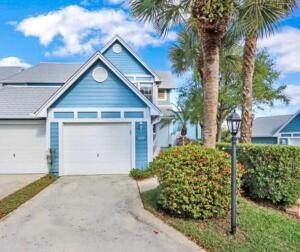1221 Ocean Dunes Circle Jupiter, FL 33477 in Jupiter Dunes
Elegant Cambria quartz surrounds the countertops and is highlighted by a mosaic pearlized backsplash. The luxurious primary suite feels like a hotel getaway and is sure to impress with its elegance. This glamorous bathroom is highlighted by an oversized shower and dual sinks. The balcony off the primary suite is the perfect way to end the day while overlooking the lake with a glass of wine. All of this in Jupiter’s best kept secret with the lowest HOA around. Ocean Dunes is a tropical paradise and the most unique townhome community in all of Palm Beach County. The community allows 2 dogs of any size and breed. Conveniently located a block from the only dog beach of its kind. Gated community with vacation style amenities. This amazing unit is like no other and not to be missed! Schedule your showing today.
*New Virtual Gate* Must have ID to enter. The unique community of Villas of Ocean Dunes offering Luxury beachside living; awaits you in this one-of-a-kind, completely renovated townhome. Just steps to Jupiter’s finest beaches, this elegant 3 bedroom/2.5 bath townhome with garage, is 1 of only 8 units situated on a corner lot with serene lake views and extra windows which provide an abundance of natural light. Step inside of this seaside beauty to be swept off your feet. The grand entryway offers dramatic voluminous ceilings, complimented by high end luxury vinyl flooring throughout. The all new and entirely open gourmet kitchen is like no other. Enjoy a huge chef’s island with seating or for entertaining.

This Listing Information is provided by: Apogee Team Realty, LLC



